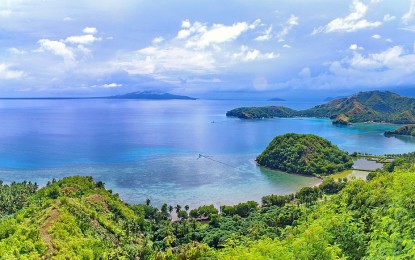
The Davao Oriental's Pujada Bay, as seen from Mati City, the province's capital. (Photo courtesy of Michael E. Peligro)
DAVAO CITY – Pujada Bay remains a “Class A” inlet based on the latest study by the Davao Oriental State University (DOrSU).
The DorSU evaluation contradicted an article released by Rappler.com entitled “Davao Oriental State University (DOrSU) study confirms Pujada Bay’s alarming pollution levels” published on August 19, citing the supposed dangerous pollution levels of the haven.
The clarification was made by the alleged source of the Rappler article, Dr. Lea Jimenez, director of the DOrSU-based Regional Integrated Coastal Resource Management Center in the Davao Region (RIC - 11).
Jimenez said the research study entitled “Nutrient Mapping of Pujada Bay” in 2015 mentioned that eight water sample stations are spread across the area to test contamination levels.
In a statement Friday, DOrSU affirmed that Pujada Bay remains as "one of the most beautiful bays in the world."
Rappler’s article said the 2015 study noted the bay's level of disease-causing microorganisms, such as E. coli, are higher than the standard for protected areas.
However, DOrSU said the concentration of E.coli is still within the allowable level for coastal waters of 70MPN/100, based on the Department of Environment and Natural Resources standards.
“Nonetheless, it is recommended for close monitoring, particularly the activities in the identified stations and their vicinity that may serve as the source of E.coli to arrest any possible increase of contamination,” the statement added.
In February 2020, Pujada Bay, along with Mayo and Balete Bays, in Mati City, Davao Oriental been included in the list of the Most Beautiful Bays in the World as declared by the Most Beautiful Bays in the World Association (MBBWA).
The DOrSU study was among the works of literature submitted for consideration by the MBBWA organizer’s declaration on Pujada, Mayo, and Balete bays.
DOrSU's 2021 study entitled “Water Profile of Pujada Bay: Implications to Management and Conservation” indicated that the number of water sampling stations has increased to 28, of which only four stations have registered beyond the standard MPN, while the 24 other stations spread in the area showed normal levels.
However, only two stations located near the coastal areas known as residential areas have registered the “presence of disease-causing microorganisms, such as E.coli.”
"Pujada Bay is still pristine, despite the identified vulnerable areas which the proper authorities might take necessary measures and mitigation," Jimenez said.
She lamented how the result of their study was misinterpreted in the media "to put Pujada Bay in a bad light." (PNA)
